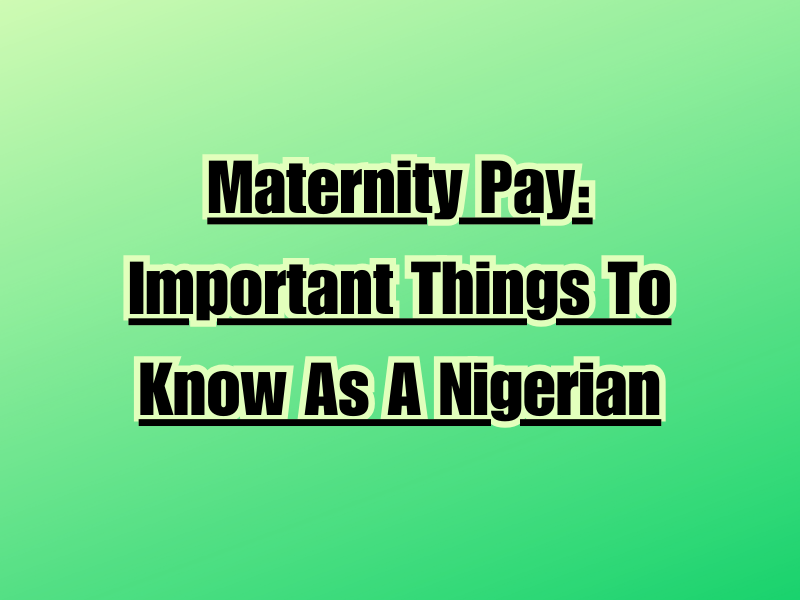Upskilling in the Digital Age: Embracing Tech
Technology has reshaped and transformed the job market....

Welcoming a baby is an exciting moment that puts all families in a joyful state. However, welcoming a baby as an international skilled worker can raise a lot of questions, especially if you are unsure of how much maternity pay you get. Nevertheless, this page is dedicated to Nigerian professional workers in the UK, providing insight and understanding about the entitlement to maternity leave and pay in the UK. Without further delay, let’s dive into the details!
Many pregnant individuals in the UK are uncertain about what maternity leave and pay is. Thus, It is crucial to address the difference between maternity leave and maternity pay.
Maternity leave is a period of time during which a pregnant woman can legally take a leave off work in other to attend to her baby before and after birth. This period of absence is designed for mothers to recover from childbirth without facing job stress. On the other hand, maternity pay is the money she receives as support during the period she is on maternity leave.
Read Also: Staying Healthy and Well: Mental and Physical Wellness for Students
Pregnant employees are eligible for statutory maternity leave if they do and meet the following:
To qualify for maternity pay, here is what you should know:
Understanding the maternity leave and pay eligibility criteria as a Nigerian professional in the UK helps you plan better and ensures you are entitled to all maternity benefits.
If you are an employee in the UK, you are entitled to 52 weeks (1 year) statutory maternity leave (SML), regardless of the time you were employed. This leave is divided into two parts: Ordinary Maternity leave and Additional Maternity Leave. Ordinary maternity leave is the first 26 weeks of your maternity leave. The additional maternity leave is the last 26 weeks of your maternity leave. After the duration of the maternity leave has been completed, you can decide to return to work. In addition, you have the right to request a working arrangement when you return to work.
The statutory maternity pay (SMP) spans for a duration of up to 39 weeks. In the first 6 weeks, you receive 90% of your average weekly salary. For instance, if your weekly salary is £200, you receive £180 as maternity pay for the first 6 weeks. For the rest of the week, the remaining 33 weeks, you’ll receive a flat rate of £184.03 or 90% of your weekly earnings, depending on which one is lower.
Read Also: Healthcare In The UK: A Guide for International Students
Returning to work after maternity leave can be daunting, however, knowing what to expect can make it easier.
After returning from maternity leave, you have the right to request flexible working arrangements. You can decide to either work part-time, full-time, or remotely, depending on your kind of work and decision.
Employees are expected to be taken care of. The employer must make the necessary adjustments and ensure that the employee is in a safe working environment.
Some industries in the UK offer extended paid maternity leave. That is, they grant employees extended time beyond the normal maternity leave, allowing them to spend more time with their newborns.
Some employers might provide higher salaries for employees who recently gave birth.
By understanding this guide, you are fully equipped with everything worth knowing regarding maternity leave and pay.
Read Also: British Workplace: Know The Cultural Nuances in the UK
Read Also: Maximizing Job Search: Important Things To Know Before Changing Jobs
Yes! Provided you reside in the UK and meet the qualification criteria, you are entitled to the benefits of maternity leave and pay.
Yes, there is a maximum statutory maternity pay. After the first 6 weeks of your maternity pay, you can receive a maximum pay of £184.03 per week.
Maternity pay is calculated based on your average weekly earnings
Yes, you need to notify your employer in advance, at least 15 weeks before the due date.
No, you can’t get financial support from the Nigerian government while on maternity leave in the UK. However, there might be extended private or public support for Nigerians living outside Nigeria that you can benefit from.
Yes, you can travel outside the country while on maternity leave. However, you should communicate with your employer to ensure it doesn’t affect your maternity benefits.
1 Comment